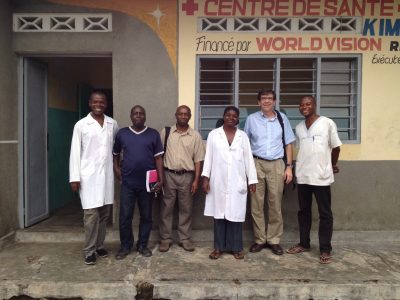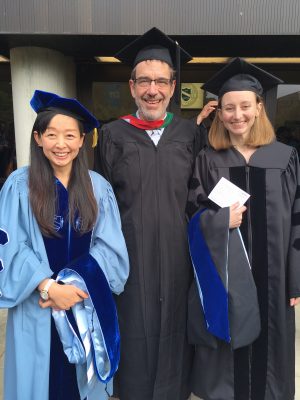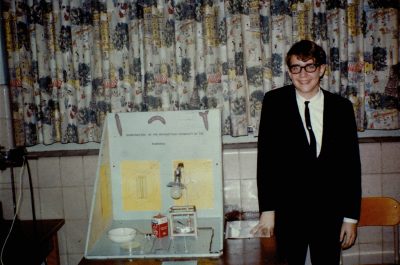Meshnick, influential scientist, generous mentor and keen-witted satirist, dies at 68
August 6, 2020

Dr. Steve Meshnick
“He was one of our kindest, most courageous and most impactful faculty members,” said a longtime colleague of Steven Richard Meshnick, MD, PhD, upon hearing the news of Meshnick’s death. “His passing is devastating and will be a huge personal and professional loss.”
A professor of epidemiology at the UNC Gillings School of Global Public Health, and of microbiology and immunology at the UNC School of Medicine, Meshnick died of cancer on August 5, surrounded by family at his home in Carrboro, North Carolina.
“Apart from being a stellar academician and a good citizen, Steve was, above all, a mensch, a person of integrity and honor,” said Til Stürmer, MD, PhD, Nancy A. Dreyer Distinguished Professor and chair of the Gillings School’s Department of Epidemiology. “I will miss his intelligence and kindness, his friendship and his wonderful wit.”
From the start of his career, Meshnick focused on global health issues. He conducted research on tropical infectious diseases in Brazil and Kenya and studied drug development and resistance in several Southeast Asian countries. During the 1980s and 1990s, he collaborated with scientists in Thailand, China and Vietnam, as well as colleagues from America, Australia and Europe.
For more than 30 years, including his nearly two decades at UNC, Meshnick worked in Africa to better understand, prevent and treat malaria, HIV/AIDS and other infectious diseases, traveling regularly to the Democratic Republic of the Congo (DRC) and Malawi to improve outcomes for those affected, including pregnant women.
With one of his graduate students, Victor Mwapasa, MD, PhD, now a professor at the University of Malawi’s College of Medicine, Meshnick worked to establish and fund Malawi’s first School of Public Health in 2003. To this day, students at the school are taught primarily by Malawians.

Dr. Meshnick stands with colleagues in the DRC.
In 2009, he won one of the Gillings School’s inaugural Gillings Innovation Lab (GIL) awards (PDF) to advance his work in mapping malaria in the DRC. A second GIL grant, awarded in 2018, supported his study of prenatal treatments to prevent mother-to-child transmission of hepatitis B virus in that country.
In the United States, Meshnick studied the epidemiology and prevention of tick-borne diseases, working with a North Carolina business to develop treated clothing that could protect forest rangers and others frequently exposed to tick bites. [See a feature in Carolina Public Health magazine (PDF).]
Recently, he was involved in groundbreaking work on tuberculosis with Doris Rouse, PhD, vice president of Global Health Technologies at RTI International and adjunct professor of maternal and child health at the UNC Gillings School.
While his own research resulted in more than 350 scientific publications, he also held a longstanding commitment to training and capacity-building, serving as mentor for more than 30 doctoral students and eight postdoctoral fellows, many from developing countries. Six of those trainees are now physician-scientists at UNC; others are professors at Duke and other research universities in the U.S. Former students also work at the Centers for Disease Control and Prevention, the National Institutes of Health and infectious disease research programs in the U.S. military. His mentees work not only in the DRC and Malawi, but also in Australia, England, The Gambia, India and Thailand.

Dr. Meshnick celebrates two new graduates.
In April 2020, Meshnick was awarded the Gillings School’s coveted John Larsh Award for Mentorship in recognition of his lasting dedication to his students’ work and his sincere interest in their lives and well-being.
As typified his priorities, he designated the Larsh monetary award to support the doctoral studies of Kashamuka (Kash) Mwandagalirwa, a longtime colleague and key collaborator in the DRC, as a means of supporting the global projects to which Meshnick had dedicated his life.
One former student is Jonathan Juliano, MD, MSPH, now a professor of medicine in the UNC School of Medicine’s Division of Infectious Diseases and associate director of the UNC Infectious Diseases Fellowship Training Program. Meshnick inspired Juliano’s interest in malaria research.
“As soon as I met Steve 15 years ago, I knew I wanted to work with him,” Juliano said. “He was a prolific scientist who had tremendous impact upon multiple communities. Even more importantly, he was an incredible human being. He was instrumental in my career development, and after my training, we became collaborators and colleagues. He was truly a ‘mentor for life.’ I couldn’t have asked for a better partner and friend in science.”
Jonathan Parr, MD, MPH, came to UNC in 2014 to complete infectious diseases fellowship training and work with Meshnick as a postdoctoral fellow. Now an assistant professor of medicine in the UNC School of Medicine’s Division of Infectious Diseases, he continues to be a member of IDEEL, the lab group Meshnick founded.
“Steve’s inclusive approach to science and his personal investment in each of us were truly incredible — and were a major factor in his developing such a large, cohesive network of successful trainees over the course of his career,” Parr said. “He leaves a legacy of generosity, inclusiveness and impactful science that will be carried on by the countless scientists and global health leaders he trained.”

Dr. Meshnick plays guitar at the Carrboro Music Festival.
Students and others who knew Meshnick delighted in his quick wit and talent for social commentary. He composed a number of mischievous, often satirical songs about public health and politics, singing and accompanying himself on guitar at local events and in music venues in the Chapel Hill area and beyond. Four of his albums are available on Spotify, and other photos and songs can be found on his website, stevemeshnick.com.
“Steve’s loss is difficult to absorb,” said Barbara K. Rimer, DrPH, dean of the Gillings School. “So many of us have been inspired by his dedication to improving health in parts of the world where many are afraid to go. In the last few years, he increased his commitment to these neglected areas and the diseases found there. He was a role model for all of us, both in the U.S. and in the countries where he worked. He was humble, brilliant, dedicated, creative and — as his music reflects — did not take himself too seriously. It was a joy to know Steve, and I am going to miss him.”
On May 15, more than 200 friends, colleagues and former students from around the world gathered online to honor Meshnick at a digital Festschrift, now available on YouTube. Rimer described the joyous celebration in a May 19 post to her blog, “Monday Morning.”
A graduate of Columbia College (biochemistry, 1972), Rockefeller University (Doctor of Philosophy, 1978) and Cornell University (Doctor of Medicine, 1979), Meshnick served on the faculties of Rockefeller, Cornell, City University of New York and University of Michigan at Ann Arbor before joining the UNC-Chapel Hill faculty in 2001.
He leaves behind his wife, Dr. Mary McKinney, their children, Maggie, Elijah, Leah and Laura, and his sister, Ellen Meshnick Immerman.
Because of public health recommendations during the current pandemic, Meshnick had requested that no gatherings take place at the time of his passing.

Dr. Meshnick’s love of research began early. Here, he presents a project at his ninth-grade science fair.
Those wishing to honor his life and work may contribute to a fund that will support training and public health efforts in the DRC. Online donations may be made at unchf.org/meshnickmemorial. Checks made payable to the UNC Health Foundation, with ‘Memorial gift in honor of Dr. Steven R. Meshick’ on the memo line, may be mailed to the UNC Health Foundation, 123 W. Franklin St., Suite 510, Chapel Hill, N.C. 27516. For more information, contact Mary Margaret Carroll at the Foundation [mcarroll@med.unc.edu or (919) 236-3137].
Condolences for the family may be left on their CaringBridge site.
Contact the UNC Gillings School of Global Public Health communications team at sphcomm@unc.edu.
